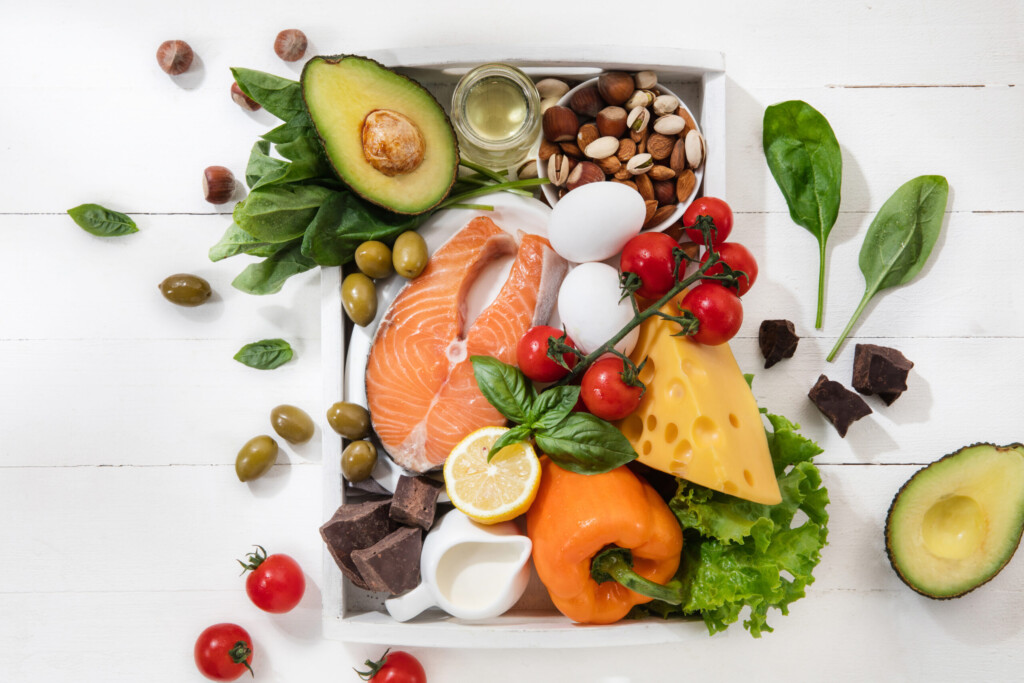Before starting a ketogenic diet, you have to know what is it
The keto diet is characterized by a low carbohydrate intake and a high fat intake. It decreases blood sugar and insulin levels and reroutes the body’s metabolism away from carbohydrates and toward fat and ketones.
This very low carbohydrate, high-fat diet is helpful for weight reduction, diabetes, and epilepsy.
Additionally, there is some evidence that it may be helpful for certain types of cancer, Alzheimer’s disease, and other illnesses.
What to consume on a ketogenic diet
The bulk of your meals should revolve around the following foods:
- Red meat, steak, ham, sausage, bacon, chicken, and turkey are all examples of meat.
- Salmon, trout, tuna, and mackerel are all examples of fatty fish.
- Whole pastured or omega-3 eggs
- Grass-fed butter with thick cream
- Cheddar, goat, cream, blue, and mozzarella are all examples of unprocessed cheeses.
- Almonds, walnuts, flaxseeds, pumpkin seeds, and chia seeds are just a few examples of nuts and seeds.
- Extra virgin olive oil, coconut oil, and avocado oil are all healthful oils.
- Avocados: entire avocados or guacamole freshly prepared
- Low-carb vegetables include green vegetables, tomatoes, onions, and peppers.
- Condiments: sea salt, freshly ground pepper, herbs, and spices

What to avoid on a ketogenic diet
Carbohydrate-dense foods should be avoided.
The following is a list of items that should be avoided or restricted on a ketogenic diet:
- Sugary beverages and meals include soda, fruit juice, smoothies, cake, ice cream, and sweets.
- Grains or starches include items made from wheat, rice, pasta, and cereal.
- All fruit, except tiny amounts of berries such as strawberries
- Peas, kidney beans, lentils, and chickpeas are all examples of legumes.
- Potatoes, sweet potatoes, carrots, and parsnips are all examples of root vegetables and tubers.
- Low-fat or low-calorie products: mayonnaise, salad dressings, and condiments.
- Certain condiments or sauces include barbecue sauce, honey mustard, teriyaki sauce, and ketchup.
- Unhealthy fats include refined vegetable oils, mayonnaise, and others.
- alcoholic beverages: beer, wine, liqueurs, and mixed drinks
- Dietary sugar-free foods include sugar-free sweets, syrups, puddings, sweeteners, and desserts.
Keto techniques and ideas for starting a ketogenic diet
While getting started on the ketogenic diet may be difficult, many tips and techniques can help.
Begin by being acquainted with food labels and calculating the grams of fat, carbohydrate, and fiber to understand how your favorite foods fit into your diet.
Meal planning in advance may also be helpful, since it may help you save more time during the week.
Numerous websites, food blogs, apps, and cookbooks also provide keto-friendly recipes and meal suggestions that you can incorporate into your own personalized plan.
Alternatively, several meal delivery services provide keto-friendly choices, providing a simple and fast way to enjoy keto meals at home.
When you’re pressed for time, consider nutritious frozen keto meals.
When attending social events or visiting family and friends, you may want to consider bringing your own food, which may make it much easier to control cravings and stay on track with your meal plan.
Risks associated with the ketogenic diet
A ketogenic diet has a slew of hazards. Topping the list is its high saturated fat content. McManus advises that you limit saturated fats to no more than 7% of your daily calories because of the connection between heart disease and saturated fats. Indeed, the ketogenic diet has been related to an increase in “bad” LDL cholesterol, which is also connected with heart disease.
Other possible keto hazards include the following:
- Nutrient deficit – “If you do not consume a diverse array of vegetables, fruits, and grains, you may be in danger of micronutrient deficiencies, such as selenium, magnesium, phosphorus, and vitamins B and C,” McManus explains.
- With so much fat to process, the diet may aggravate any pre-existing liver issues.
- Kidney issues – The kidneys assist in the metabolization of protein, and McManus believes the keto diet may overburden them. (The current recommended daily protein intake for women is 46 grams, and for men is 56 grams.)
- Constipation – The keto diet excludes foods high in fiber, such as grains and legumes.
- Confusion and mood swings – “To operate properly, the brain needs sugar from healthy carbs. Low-carbohydrate diets may contribute to disorientation and irritation “McManus asserts.
These hazards accumulate — therefore consult a physician and a qualified dietitian before starting a ketogenic diet.

